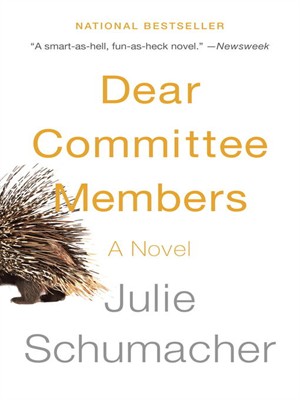I read it in one sitting, stifling laughs, snorts, and chuckles as I went. Set in academe though it is, like ‘Dilbert’ it resonants with life in any large organisation these days. The drive for ever more meaningless detail and perfunctory documentation that is never used is endless and general. Nor is it only in academe that one part of the organisation thrives while another starves. Then there is the snivelling twelve-year old from Tech who mocks those he supports.

Professor Jay Fitger has long since made a separate peace with research and teaching, instead spending many a long day writing letters of recommendation for any and every one, each peppered with asides about life, his life, The universe, and the university that is grinding him to dust. An old salt, he knows many of his correspondents, been married to some, thrown-up on others, and takes that intimacy as licence to be ever more long-winded, circuitous, and explicit. Professor Fitger is surly, mendacious, anachronistic, energetic, and sharp along the edges.
His letters support students applying for internships (unpaid jobs), scholarships, two-week training workshops, jobs in mortuaries, summer jobs, places in a queue, and seminars taught by people Fitger despises but needs must, and for colleagues applying for tenure, part-time jobs, summer jobs in garage, meaningless awards, their own jobs twice in one year, honorary titles (more work for no money), and the use of the toilets where even that prerogative is limited. The point is, everything has to be applied for and every application must be supported by five letters of recommendation.
Fitger brings some of this load on himself since he never says no, and ends up writing in support of candidates — both students and professors — he does not know, nor want to know. along with those he knows and does not like. That is understandable. There are some colleagues, there are some students to whom it is far easier to say yes than no. If they want a letter it is best to do it, rather than try to talk them out of it. Safer, too.
His passing descriptions of colleagues brought tears to my eyes. Two-thirds of the members of his department bear the scars of long-term abuse from the university, mostly imagined but some real, and busy themselves tending to personal grudges like scraps of carrion on which they gnaw in the corners of the open-plan work space they now have instead of offices with doors. Few will survive the killing fields of administration in the next re-organisation. Fidget expects his department will be re-organised out of existence soon.
Against such threats to its existence there was the Department retreat where instead of discussing survival they argued for hours about the placement of a comma in a resolution that no one voted for when it was finally presented. Exhausted and frustrated, they turned to drink.
When not likening students to primordial ooze without individuality, Fitger says of one: she has endured the intellectual abuse and collective disdain for which this university is widely known, overcome administrative snafus of Orwellian proportions, and been penalised by other professors because she is his supervisee.
Though the best is perhaps the periodic correspondence with the campus Wellness Office about a disruptive student, one who terrorises the other twenty-nine in a discussion section, a fact deemed irrelevant to the Wellness Office, which repeatedly charges Fitger to be more supportive, understanding, and lenient. If not, then it is Fitger who is the problem! We have training courses for that! One more irritating complaint and off Fitger will go to be re-educated, Comrade Number One.
 Julie Schumacher
Julie Schumacher
Class, there is further reading. Another tale told in letters is Mark Harris, ‘Wake up, Stupid’ (1959) which left me gasping for air in 1980, according to the records. Then there is Iain Pears’s ‘The Titian Committee’ (2004) in which the chair of the eponymous committee, despairing of achieving consensus among the fractious members of said committee, begins to murder them, one-by-one, in the hope that the survivors will be more pliable. As if! The survivors become even more determined to resist consensus. Evidence be damned!
Skip to content
